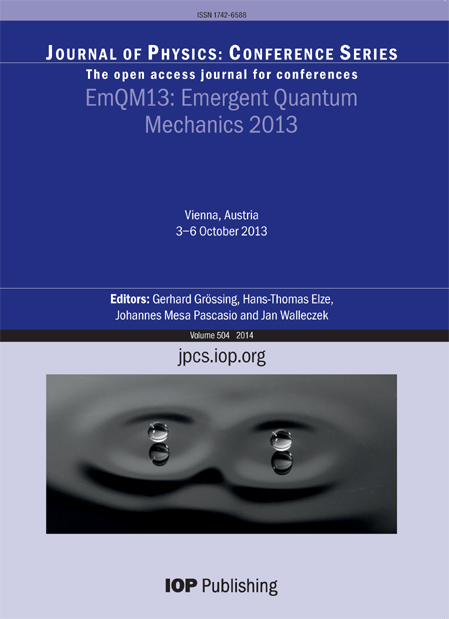The EmQM13 conference took place 23-25 october 2015 in Vienna, Austria.
2nd International Symposium about Quantum Mechanics based on a »Deeper Level Theory«
The symposium invites the open exploration of an emergent quantum mechanics, a possible »deeper level theory« that interconnects three fields of knowledge: emergence, the quantum, and information. Could there appear a revised image of physical reality from recognizing new links between emergence, the quantum, and information? Could a novel synthesis pave the way towards a 21st century, »super-classical« physics? The symposium provides a forum for discussing (i) important obstacles which need to be overcome as well as (ii) promising developments and research opportunities on the way towards an emergent quantum mechanics. Contributions are invited that present current advances in both standard as well as unconventional approaches to quantum mechanics.
Scientific Advisory Board
Ana María Cetto, Lajos Diósi, Thomas Elze, Maurice de Gosson, Edward Nelson, Theo Nieuwenhuizen, Helmut Rauch
Organizers
Gerhard Grössing, Jan Walleczek
Conference Proceedings
EmQM13: Emergent Quantum Mechanics 2013 3–6 October 2013, Vienna, Austria
Journal of Physics: Conference Series Volume 504 (2014).

AINS contributions
The Non-Signalling theorem in generalizations of Bell’s theorem
J Walleczek together with G Grössing (AINS)
Does „epistemic non-signalling“ ensure the peaceful coexistence of special relativity and quantum nonlocality? The possibility of an affirmative answer is of great importance to deterministic approaches to quantum mechanics given recent developments towards generalizations of Bell’s theorem. By generalizations of Bell’s theorem we here mean efforts that seek to demonstrate the impossibility of any deterministic theories to obey the predictions of Bell’s theorem, including not only local hidden-variables theories (LHVTs) but, critically, of nonlocal hidden-variables theories (NHVTs) also, such as de Broglie-Bohm theory. Naturally, in light of the well-established experimental findings from quantum physics, whether or not a deterministic approach to quantum mechanics, including an emergent quantum mechanics, is logically possible, depends on compatibility with the predictions of Bell’s theorem. With respect to deterministic NHVTs, recent attempts to generalize Bell’s theorem have claimed the impossibility of any such approaches to quantum mechanics. The present work offers arguments showing why such efforts towards generalization may fall short of their stated goal. In particular, we challenge the validity of the use of the non-signalling theorem as a conclusive argument in favor of the existence of free randomness, and therefore reject the use of the non-signalling theorem as an argument against the logical possibility of deterministic approaches. We here offer two distinct counter-arguments in support of the possibility of deterministic NHVTs: one argument exposes the circularity of the reasoning which is employed in recent claims, and a second argument is based on the inconclusive metaphysical status of the non-signalling theorem itself. We proceed by presenting an entirely informal treatment of key physical and metaphysical assumptions, and of their interrelationship, in attempts seeking to generalize Bell’s theorem on the basis of an ontic, foundational interpretation of the non-signalling theorem. We here argue that the non-signalling theorem must instead be viewed as an epistemic, operational theorem i.e. one that refers exclusively to what epistemic agents can, or rather cannot, do. That is, we emphasize that the non-signalling theorem is a theorem about the operational inability of epistemic agents to signal information. In other words, as a proper principle, the non-signalling theorem may only be employed as an epistemic, phenomenological, or operational principle. Critically, our argument emphasizes that the non-signalling principle must not be used as an ontic principle about physical reality as such, i.e. as a theorem about the nature of physical reality independently of epistemic agents e.g. human observers. One major reason in favor of our conclusion is that any definition of signalling or of non-signalling invariably requires a reference to epistemic agents, and what these agents can actually measure and report. Otherwise, the non-signalling theorem would equal a general „no-influence“ theorem. In conclusion, under the assumption that the non-signalling theorem is epistemic (i.e. „epistemic non-signalling“), the search for deterministic approaches to quantum mechanics, including NHVTs and an emergent quantum mechanics, continues to be a viable research program towards disclosing the foundations of physical reality at its smallest dimensions.
J Walleczek, G Grössing
The Non-Signalling theorem in generalizations of Bell’s theorem
J Walleczek and G Grössing 2014 J. Phys.: Conf. Ser. 504 012001
Relational causality and classical probability: Grounding quantum phenomenology in a superclassical theory
By introducing the concepts of „superclassicality“ and „relational causality“, it is shown here that the velocity field emerging from an n-slit system can be calculated as an average classical velocity field with suitable weightings per channel. No deviation from classical probability theory is necessary in order to arrive at the resulting probability distributions. In addition, we can directly show that when translating the thus obtained expression for said velocity field into a more familiar quantum language, one immediately derives the basic postulate of the de Broglie-Bohm theory, i.e. the guidance equation, and, as a corollary, the exact expression for the quantum mechanical probability density current. Some other direct consequences of this result will be discussed, such as an explanation of Born’s rule and Sorkin’s first and higher order sum rules, respectively.
G Grössing, S Fussy, J Mesa Pascasio and H Schwabl
Relational causality and classical probability: Grounding quantum phenomenology in a superclassical theory
G Grössing et al 2014 J. Phys.: Conf. Ser. 504 012006